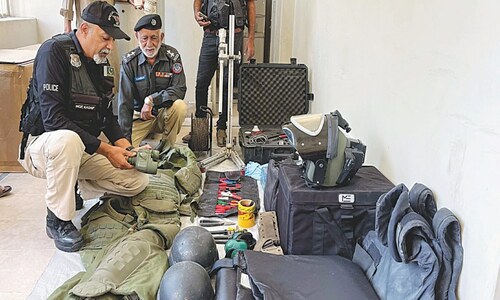HYDERABAD: The Sindh Human Rights Defenders Network has said that access to basic amenities, free healthcare and education and adequate housing is increasingly getting out of reach of most of Pakistan’s 220 million people and conditions have further worsened after catastrophic floods in Sindh.
Leaders of the network said at annual convention on human rights defenders chaired by senior advocate Yousuf Leghari at local press club on Friday that Pakistan’s track record on freedoms of association, peaceful assembly and expression had been murky for decades, according to a press release.
They said that civil society groups and activists had long been labeled as foreign agents funded by anti-Pakistan forces and it was touted that Pakistan was one of the most dangerous countries in the world for journalists.
They said that religious minorities were persecuted and discriminated against by institutions, draconian laws and violence and conditions had further worsened after catastrophic floods in Sindh.
They said that according to the latest Global Gender Gap Report, Pakistan ranked 145th on the list of 146 countries, officially making it the second worst country in terms of gender equality. Recent challenges posed by floods served to aggravate the already worsening condition of women, they said.
Many women were not allowed by their male family members to go live in camps because of the so-called honour of the family attached to women. Those who had to move into camps had to cope with extreme unhygienic conditions, he said.
They suggested that Sindh government take policy-level measures to adopt a more women-oriented stance to understand and mitigate social hindrances, mobility barriers, sanitary issues, healthcare troubles and many other issues that increased women’s vulnerability during disasters.
They said that criminal justice system of Pakistan was considered exploitative, defective and unequal. It was generally believed high crime rate was associated with inherent problems found in criminal justice system, they said.
The criminal and civil justice system in Pakistan was plagued by prolonged delays, which often resulted in axiomatic ‘justice delayed justice denied’, they said.
They said that the delay could easily be observed in any judicial process and it potentially harmed provision of justice to individuals during civil disputes or criminal prosecution. Flaws in criminal justice system resulted in judicial impunity and weak prosecution, they said.
Ghulamullah Chang, president High Court Bar Association Hyderabad; Inderjeet Lohano advocate, vice president HCBA; Sachal Awan, member Sindh Bar Council; Zulfiqar Halepoto, Razzaq Umrani, Imdad Chandio, Sajida, Firdous Sangi and Marvi Awan also spoke at the convention.
Published in Dawn, December 17th, 2022














































Dear visitor, the comments section is undergoing an overhaul and will return soon.